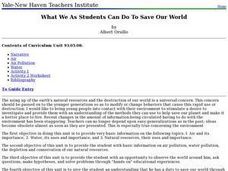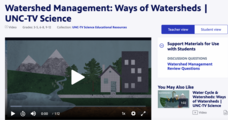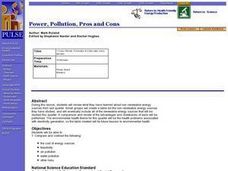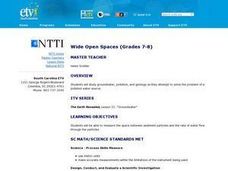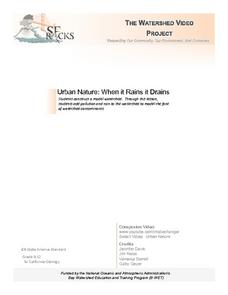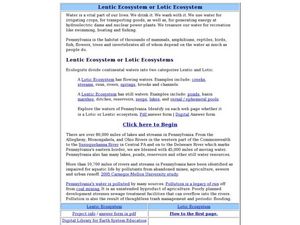Curated OER
What Are We?
Students describe different types of water pollutants. They complete experiments in which they observe the affects of water pollution on algae. They also brainstorm and list three causes of each water pollutant.
Curated OER
What We As Students Can Do To Save Our World
Learners investigate air and water pollution, and the conservation of natural resources.
Curated OER
Groundwater Modeling
Pupils evaluate the effects of point and non-pointy sources of water pollution using a model. They assess human impact on water quality. Students build a model which represents an aspect of the hydrosphere and compare their model with...
Curated OER
Language Arts: Investigating Issues That Matter
Students are able to become more informed about the dangers of water contamination by sharing their prior knowledge with each other. They discover the importance of communicating these dangers to the public.
Curated OER
Turning the Tide on Trash: Marine Debris Curriculum
Seven pages of fascinating reading on marine debris preface the activities in this lesson plan. Four different activities are employed to simulate how the debris is distributed in the ocean and along beaches. Early ecology learners...
Curated OER
Sustainable Livestock
Young scholars investigate healthy eating habits by researching livestock. In this food sustainability lesson, students research the negative impact factory farming has on our environment due to pollution. Young scholars define...
PBS
Watershed Management: Ways of Watersheds | UNC-TV Science
Inspire young conservationists to protect the environment with a short activity on water quality and watersheds. Participants discover the importance of watershed management, learn about water quality problems, and discover possible...
Curated OER
Are You Thirsty: The Effects of Pollution on Drinking Water
Middle schoolers discuss the different causes of water pollution. In this ecology lesson, students brainstorm ways to purify polluted water. They formulate their conclusion based on the results of the experiments.
Curated OER
Water, Water, Everywhere (High School)
Students view different types of water to make the point that salt or polluted water isn't useful for drinking water. They chart causes, consequences and solutions to water scarcity based on internet research. They write an essay as...
Curated OER
Arsenic Contamination: Water Filtration
Students work in groups to design a filtration process that will separate clean water from polluted water. They organize data in tables or graphs and present their findings to the class. Students identify further safety protocols that...
Curated OER
Human Impact on Water Quality
Students identify at least three common repercussions of developing water front property on water quality. They describe three sources of water pollution. They research the organism striped bass and observe it if striped bass is available.
Curated OER
Power, Pollution, Pros and Cons
Students review what they know about non-renewable energy, compare and contrast advantages and drawbacks of each type, such as cost of energy sources, feasibility, air pollution, water pollution, and other risks, and create table listing...
Curated OER
Acid Rain Environment Pollution
Students combine different materials to create chemical reactions. In this chemical reaction lesson plan, students will combine different materials to create chemical reactions and define these results as acids or bases. They will also...
Curated OER
Caution: Fix It!
Young scholars explore the concept of environmental stewardship. In this science instructional activity, students investigate events that have harmed coastal resources and how human activity has restored coastal resources.
Curated OER
How would an oil spill affect a Marine Sanctuary?
Students explore the concept of environmental stewardship. In this science lesson, students discover how scientists assess damages to the environment following oil spills. Students conduct a simulation of a public meeting in order to...
Curated OER
TE Activity: Pollution Politics
Students examine how a bill becomes a law in the US Congress. They investigate legislation about global warming. They determine the role of engineers as they educate Congress, the public and other government institutions about global...
Curated OER
Not A Drop To Drink
Fifth graders discuss ways that humans pollute our natural water supply. They observe a video about water pollution. Students identify eight different ways water is contaminated. They investigate an oil spill by conducting a hands-on...
Curated OER
Wide Open Spaces
Learners examine the problem of groundwater pollution. In groups, they develop a solution to solve the problem of a local polluted water source. They also practice measuring the space between sediment particles and the rate of water flow.
Curated OER
Playing in mud puddles
Students examine the effects of rainfall on different surfaces and discuss water pollution. They review the water cycle and the uses of water in daily lifestyles. Students discuss the effects of soil run off in streams and rivers.
Curated OER
When It Rains it Drains
Young scholars examine the major paths of water on the Earth's surface, and to investigate the many factors that contribute to those paths. Students demonstrate their understanding of a watershed by identifying the defining features of a...
Polar Trec
Why Can’t I Eat This Fish?
Can turning on the television lead to toxins in the food supply? The instructional activity offers an opportunity for young scientists to complete guided research. A worksheet lists each question as well as the web page necessary to...
Curated OER
WET Science Lesson #5: Pass the Salt Please! (How Road Salt Affects Wetlands)
As an anticipatory set, biologists listen to the story of Ruth Patrick, a scientist who used algae to detect water quality. They observe a demonstration of osmosis and diffusion. In their lab groups, they place Elodea stalks in...
Curated OER
What's In Your Stream?
Students conduct hands-on fieldwork in order to investigate water quality of a nearby stream. They discuss watersheds and how it affects water quality as well as identify any causes of changes or pollution in the area water before...
Curated OER
Lentic Ecosystem or Lotic Ecosystem
Students explore the differences between lentic and lotic ecosystems. For this ecology lesson students study the water systems in Pennsylvania.
Other popular searches
- Water Pollution Worksheets
- Water Pollution Experiments
- Air and Water Pollution
- Sources of Water Pollution
- Air Water Pollution
- Water Pollution Lesson Plans
- Water Pollution Activity
- Bacterial Water Pollution
- Water Pollution Works
- Water Pollution Lesson
- Water Pollution Oil Spills
- Types of Water Contamination



